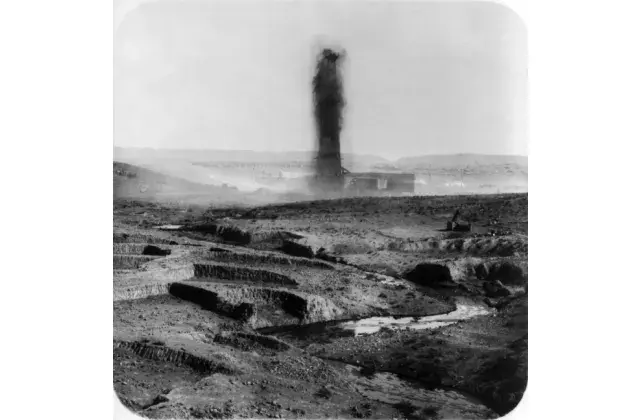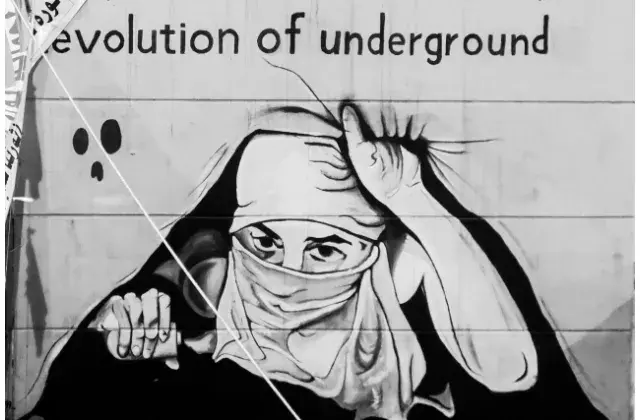شۆڕشی ڕەمەزان، کودەتایەک لەناو کودەتا و سەردەمی عارف (١٩٦٣ - ١٩٦٨)

شۆڕشی ڕەمەزان کودەتایەکی سەربازی بوو، (دەستبەسەرداگرتنی کۆنترۆڵی سیاسی ماکینەی دەوڵەت لەلایەن گرووپێکی بچووکەوە، کە زۆرجار ئەفسەرە سەربازییە پلە باڵاکان سەرکردایەتییان دەکرد)، بە سەرۆکایەتی پارتی سۆسیالیستی عەرەبی بەعسی عێراق و گرووپە هاوسۆزەکانی ناسیۆنالیستی عەرەبی لە هێزە چەکدارەکانی عێراق، لە ٨ی شوبات تا ١٠ی شوباتی ١٩٦٣. لەسەر فەرمانی ئەنجومەنی نیشتمانیی فەرماندەی شۆڕشگێڕیی(NCRC) کە تازە پێکهێنرابوو، سەرۆکوەزیرانی عێراق عەبدولکەریم قاسم لە ٩ی شوباتی ١٩٦٣ لەسێدارەدرا، دەسەڵاتی نۆ مانگی دواتری حزبی بەعس بە "دەسەڵاتی تیرۆر" وەسفکرا، لەگەڵ دەستبەسەرکردن و لەسێدارەدانی هەزاران دڵسۆزی قاسم و کۆمۆنیستەکان وەک لە چیڕۆکی شەمەندەفەری مردن بۆ سەماوەدا گێڕادراوەتەوە. زیاتر لە ٥٠٠ دەستبەسەرکراوی زیندانی ژمارە ١ کە پێکهاتبوون لە دەستەبژێری ئەکادیمی وڵات، لە عارەبانەیەکی بارهەڵگردا بارکران، بەبێ هیچ هەواگۆڕکێیەک لە ناو عەرەبانەکە و ڕەوانەی زیندانی سەماوە کران. فەرمانی شۆفێری شەمەندەفەرەکە ئەوە بوو کە بە هێواشی لێبخوڕێت، چونکە دەستگیرکراوەکان سزای خنکانیان بەسەردا سەپێندرابوو، بەڵام عەبد عەباس ئەل مەفرەجی، کە شۆفێر بوو دوای ئەوەی باسی بارە مرۆییەکەی بۆ کرا خێرایی شەمەندەفەرەکەی زیاتر کرد، بەمەش ژیانی زیاتر لە ٥٠٠ کەسی ڕزگار کرد، وەک قارەمانێک لەلایەن دانیشتوانی عێراقەوە سەیر دەکرێت.
یەکەمین حوکمی حزبی بەعس لە تشرینی دووەمی ساڵی ١٩٦٣ بە 'کودەتا لەنێو کودەتا' بە سەرکردایەتی سەرۆک کۆمار عەبدولسەلام عارف کۆتایی هات. لە ١٨ی تشرینی دووەمی ١٩٦٣، عارف ڕایگەیاند کە سوپا دەسەڵاتی گرتە دەست. لەگەڵ عارف، دواجار ناسیۆنالیستە قەومیەکان (نەتەوەپەرستانی عەرەب، ناسرییەکان) هاتنە سەر دەسەڵات. لە ٣ی ئایاری ١٩٦٤ دەستوورێکی کاتی دەرچوو 'کەسایەتی عەرەبی' و 'گەلی عێراق'ی دووپاتکردەوە و جەختی لەسەر ئامانجی یەکێتی عەرەبی کردەوە. دوابەدوای ئەوە ڕێککەوتنێکی سەرەتایی لەسەر یەکخستنی داهاتووی عێراق و میسر کرا، پڕۆژەیەک کە هەرگیز ڕووی نەدا، چونکە هەردوو وڵات هەر زوو درکیان بەوە کرد کە جێبەجێکردنی نموونەی میسری لەسەر عێراق کار ناکات.
بە پەیڕەوکردنی نموونەی میسری، یەکێتی سۆسیالیستی عەرەبی عێراق وەک تاکە حیزبی یاسایی لە عێراق ناسێندرا، کە لە ١٤ی تەمموزی ١٩٦٤ دامەزرا. عارف بانکەکان، کۆمپانیاکانی بیمە و ٣٠ کۆمپانیای پێشەنگی پیشەسازی بە نیشتمانی کرد. ئەفسەرەکان بوونە بەڕێوەبەری گشتی کە بە تەواوی سەرقاڵ بوون بە بەڕێوەبردنەکە کە بووە هۆی گەندەڵی، بەفیڕۆدان، سەرمایەگوزاری و دەوڵەمەندکردن. ئەمەش لە بەرامبەردا بووە هۆی داڕمانی ئابووری و زیادبوونی بێکاری. لە هەوڵێکدا بۆ چارەسەرکردنی کێشە ئابورییەکان، عارف پێشنیاری کرد کە کۆمپانیای نەوتی عێراق بە بڕی٢٠ملیۆن پاوەند وەبەرهێنان بکات بۆ پشکێک لە کۆمپانیای نیشتمانی نەوتی عێراق (INOC). هەوڵی حکومەت بۆ ئاشتی لەگەڵ کورد شکستی هێنا و کۆتایی هات بە ڕووبەڕووبوونەوەی بەردەوامی چڕی سەربازی لە نێوان حکومەتەکەی و کورد تا ساڵی١٩٧٠.
عەبدولسەلام عارف لە ١٣ی نیسانی ١٩٦٦ لە تێکشکانی فڕۆکەدا گیانی لەدەست دا و عەبدولڕەحمان عارفی برای شوێنی گرتەوە. تا ئەم قۆناغە، فەرمانگەی سەربازی بەعس و فەرماندەیی هەرێمیی(قیادەی قوتڕی)، جارێکی دیکە دەستیان کرد بە دانانی پلان بۆ دامەزراندنی ڕژێمێکی بەعسی. هاوپەیمانیان لە سێ ئەفسەری سەرەکی لە پاسەوانی کۆماری دۆزیەوە و لە ١٧ی تەمموزی ١٩٦٨ عەبدولڕەحمان عارف بە کودەتایەکی بێ خوێن لادرا و دوورخرایەوە بۆ تورکیا. ڕژێمێکی نوێ پێکهێنرا و حەسەن ئەلبەکر وەک سەرۆک کۆمار. پەشیمان بوونەوە لە زیادەڕۆییەکانی ساڵی ١٩٦٣ وبە باوەڕێکی خێرا لەگەڵ کورد دانوستان کرا. دڵسۆزانی سەردەمی عارف زیندان یان سزای لەسێدارەدانیان بەسەردا سەپێندرا. حکومڕانی ٣٥ ساڵەی حیزبی بەعس دەستی پێکرد.
هذا المحتوى مرخص بموجب رخصة المشاع الإبداعي CC BY-NC 4.0.






